
And here we are, the Top 5 of 2020! Make sure you’ve read the previous entries in our list (go here for 25-16, and here for 15-6) before diving into these write-ups. As always we welcome your (polite) thoughts on which albums on and off our radar were your favourites of the year in the comments. We’re sure they’ll be some we missed, and seeing what other folks enjoyed the most gives us a more global perspective on matters. Now, without further ado, I Die: You Die’s five favourite records of 2020.

5. Morwan
Zola-Zemlya
Feel It Records
We’ve made no secret of the fact that there was a big uptick in our post-punk coverage this year at I Die: You Die, mostly due to a clutch of records which had something to offer than polite recreationism. But no record blew apart our understanding of the genre more than the sophomore record from Ukranian artist Alex Ashtaui’s Morwan project. By retrofitting Ukranian and Arabaic folk music structures to fit post-punk, Ashtaui doesn’t just uncover an intriguing intersection of musical histories, but brought to bear a sense of drive and energy unlike anything else we heard this year.
We can’t speculate as to what degree these commonalities naturally exist between post-punk and the folk music Ashtaui is drawing upon, as opposed to his experiences with the former being shaped by the latter. But regardless of origin or the specifics of music theory, Zola-Zemlya is a masterclass in refreshing relatively traditional rock instrumentation. Time and again, long, hypnotic, looping trances are constantly being built through both grind and riff and are eventually released, bringing peace, fury, or both as needs merit. Note the way in which the monomaniacal no wave riffs of “Черное солнце” eventually crash into a hardcore-styled, floorpunching breakdown, for instance. Some rough translation of the lyrics points towards fascination with the equally raw and sanguine sublimity of nature, and it’s that same combination of violence and harmony which Ashtaui so expertly used to craft one of the most unique records of any stripe we heard all year. Read our full review.
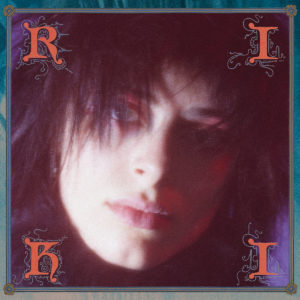
4. Riki
self-titled
Dais Records
If you’re only now finding out about Riki’s debut LP of toothy dark synthpop you’re in for a real treat. A mixture of classic neue deustch welle, new wave and italo disco influences, the eight songs on Riki have a rare immediacy commensurate with the record’s rich sound design and production sensibility (courtesy of Inhalt’s Matia Simovich). It’s a record that conjures a tasteful fantasy version of the early 80s without tripping over into blatant homage or imitation.
Surely that’s due to the presence of Riki herself, who establishes herself as a personality and as a presence as crucial to the record’s appeal as its vintage style markers. She delivers bounce and pep on the speedy “Earth Song”, is both wistful and winsome on the breakout pop of “Napoleon” and does teutonic iciness with aplomb on “Strohmann” and “Böse Lügen”. It’s a formula so simple as to be almost ludicrous; catchy pop tunes recorded to sound decadent without losing their minimalism and performed distinctively and confidently. Of course that can be an impossibly difficult needle to thread if any one aspect is found wanting, which is what makes the record doubly listenable: it’s sheer consistency. There’s no moment on Riki that doesn’t feel like it’s been executed with the utmost passion and attention to detail, and yet somehow it has a weightless and easy quality that lent itself to infinite replays. No record in 2020 was this much fun to revisit, or so close at hand when we needed something to buoy us up with pop charm. Read our full review.

3. Rein
Reincarnated
Rein Records
After making an engaging first pass at bringing punk energy to old school EBM, Joanna Reinikainen tried her hand at introducing EDM and electropop into her sound to mixed results. The fully formed aesthetic of the first full-length Rein release, then, came as a shock not only for its nigh-flawless hybridization of classic EBM and throwback R&B and new jack swing rhythms, but also for the end to end strength of the tunes cranked out under that unexpected but very welcome presentation.
It’s hard to keep from gawking at the audaciousness of Reincarnated‘s genre bending. After all, it’s not everyday that you hear tracks that have you thinking of Dr. Alban and Nitzer Ebb at the same time, all while playing with the rhetoric of Vigilant Citizen-style Illuminati/celeb brainwashing conspiracies (eat your hearts out, Grimes and Poppy), but “Puppetmaster” has you covered. Need a bit of a time-out from the crossover sounds? Go a round in the pit with “Bodyhammer”. As has been noted by several parties, the closest parallel for tracks like “Accelerate” and “Reactivity” might be Janet Jackson’s timeless Rhythm Nation 1814 – a very steep point of comparison which Reincarnated rises to meet. The styles and ideas Rein indulges in on her debut are impressive specifically because they’re universally great ideas that have so much room to go sideways, and yet Reinikainen bangs them out one after the other with a preternatural certainty of purpose. It’s a big showy take on modern body music as produced and performed by an artist who sounds like she never had a doubt in her mind that the record was going to be amazing. Long may she Rein. Read our full review.
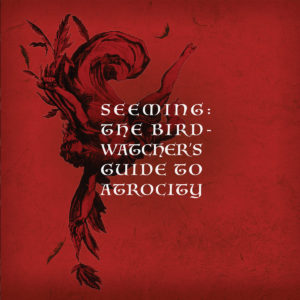
2. Seeming
The Birdwatcher’s Guide To Atrocity
Artoffact
Alex Reed started the year by writing, recording, and releasing a record all within the span of its first 24 hours. Had he known how things were going to shake out he could have been forgiven for crawling under his piano and hibernating until next summer. The rest of us can be thankful he didn’t, as in The Birdwatcher’s Guide To Atrocity he offered not just a beautiful record, but a means of meditating on the immediate, the manageable, and the tactile in a year of invisible, omnipresent, and insurmountable nightmare. The broad ambition of Reed’s first two Seeming albums became the project’s calling card, and whether it manifested in grand, choral odes to the levelling power of nature (“The Burial”) or art rock rhapsody trying to outrun civilization (“At The Road’s End”), it was exactly the sort of genre-bending earnestness and excess we didn’t know we were waiting for. But this record is something very different.
Smaller and more personal than either Madness & Extinction or SOL, Birdwatcher’s Guide eschewed a totalizing aesthetic to instead give us snapshots of Reed’s musical motifs (the stormy industrial funk of “End Studies”, “Someday Lily”‘s synthpop by way of bass music) and his thematic fixations. Bit by bit, through contemporary reference (everything from the atrocities of the Trump to the tragic relatability of the “This is fine” dog) and painful personal reflection (reckoning with the deaths of schoolmates and cats and suicidal ideation), a sense of wounded and defiant survival begins to build, until the post-punk fanfare of “Reality Is Afraid” inaugurates the utopian hope which sits at the heart of so much of all our crippling depression, this year more than ever. That’s the secret relatability of The Birdwatcher’s Guide To Atrocity‘s appeal, the acknowledgment that things are historically bad for most everyone, and the suggestion of the means through which to cope with it all. The first words on single “Go Small” are a simple and profound survival directive: “Write the song you need to hear”. Ironically, it’s Reed who wrote the songs we needed to hear in 2020, again and again. Read our full review.

1. Drew McDowall
Agalma
Dais Records
For those with a deep-seated investment in Coil it’s impossible to not hear Agalma as a continuation of McDowall’s work within that most sainted of sects – the watery marimba tones which guide “Agalma I (Folding)” are the welcome arrival of a long absent friend – though that frame of reference certainly isn’t required to get on board with the gardens of strings and vocals into which McDowall weaves his modular threads. Amongst its other strengths, Agalma underscores just how much of Coil’s latter-era sound was defined by McDowall, and moreover what a vital electronic composer he remains. Apart from the Compound Eye releases he’s remained relatively mum since the end of Coil, and his run of releases for Dais over the last five years have been a triumphant return made under his own name and direction.
McDowall’s landscapes are nothing if not mutable – croaking at one moment then morphing into angelic harmony, immediate and organic then suddenly casting you into the metaphysical slipstream – but there’s no intent to deceive or shock with this sort of sleight of hand. Each of Agalma‘s movements seems to be pursuing its own equanimity and place within the larger unity of the work – there may be unexpected turns and discoveries on the gnostic path, but there’s an invariably upward slant (those conversant in Thelema could likely make comment upon action taken in service of the Holy Guardian Angel). If the deity to which this votive agalma is dedicated remains anonymous (Caroline Schub’s cover art assemblage could potentially point towards anything, including the detritus of modernity), we’re each perhaps free to apply its wet pulses and curving sweeps however we see fit.
That abstraction runs the risk of alienating the listener, of severing any emotional connection through the sheer alienness of so many of the drones and sonic manipulations that serve as McDowall’s orchestra. It’s a concern that is addressed by the sheer loveliness of so much of Agalma: the unearthly voices and strings of “Agalma II” cut deeply in spite of their uncanny quality, as do the deep, earthy not-quite-voices-are-they? tones that weave between pillars of static on “Agalma VI”. And yet the record flies in the face of so much of what we take for granted as being pleasing musically; atonal gongs bang on “Agalma VII” threatening to wash away its delicate vocalizations, “Agalma V” drapes itself in self-destructing patches of synth noise that tease the ear before winking out of existence. It’s each composition’s depth that proves so fascinating. Whether repulsing or attracting, no movement ever lacks for dimension, weight and a seeming graspability that conjures intimacy.
It’s perhaps due to the collaborative nature of the record (the album was made remotely in concert with a host of international experimentalists with their own area of expertise) that Agalma feels like something of a communication, a message conveyed through broad musical abstraction. It never seeks to have the listener decode it though, rather it invites them deeper and deeper into itself, where it can be experienced nakedly, basally. Whatever the listener finds while enveloped in Agalma is theirs to consider. For its contemplativeness, its profundity and its sheer beauty, Drew McDowall’s Agalma is our record of the year. Read our full review.
And that’s it for written 2020 coverage on I Die: You Die! Tune in to the podcast tomorrow for some broad thoughts on the year that was in Our Thing, and we’ll see you back here in 2021.

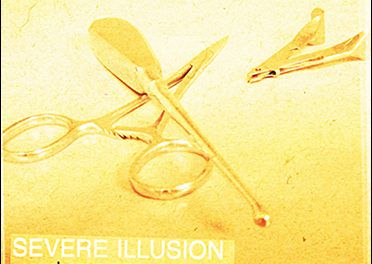
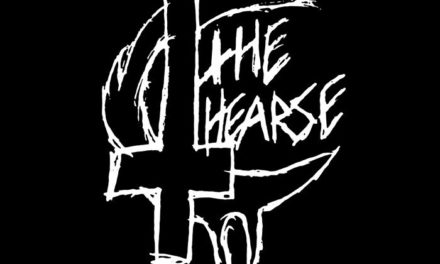
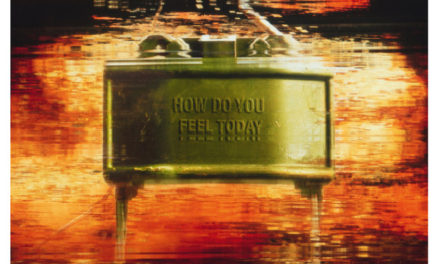
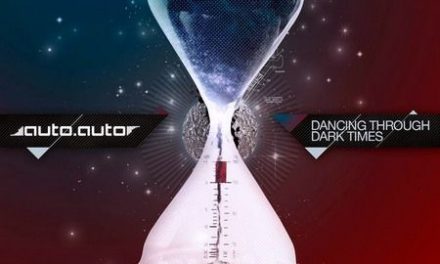
Top 10 Electraumatisme 2020 :
01 – Statiqbloom – Beneath the Whelm
02 – Linea Aspera – LP II
03 – My Love Kills – Imitatio Dei
04 – Rein – Reincarnated
05 – Outpost 11 – Transition
06 – Jihad – Retrospekt
07 – Amorphous – Moth Metaphor
08 – Dive – Where Do We Go from Here?
09 – Placebo Effect – Shattered Souls
10 – Precision Field – Love & Debauchery
I used to listen to you when I drive across France but with confinment, I missed a lot of your podcast guys.
Hope to hear you more on 2021. Keep on your great work !
1- Fix 8 seed 8 The Inevitable relapse
2= Funker Vogt Element 115
3- Placebo Effect Shatered souls
4- Autechre Sign
5 Jihad Retropekt